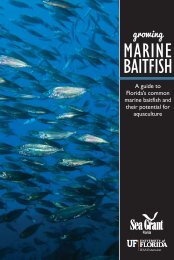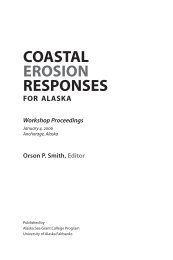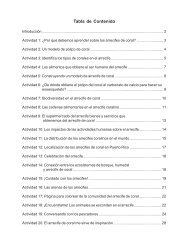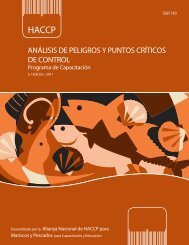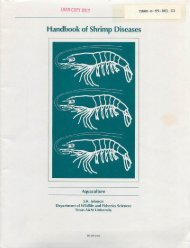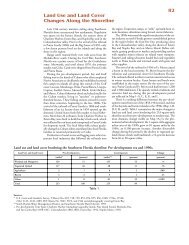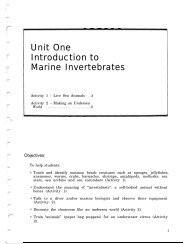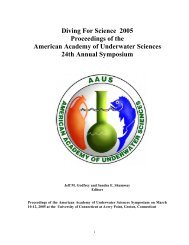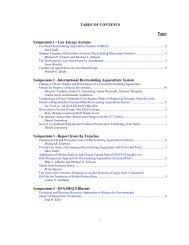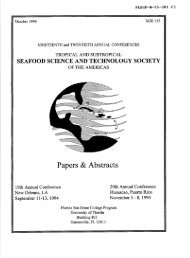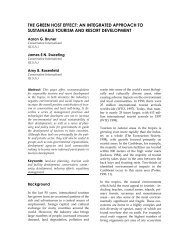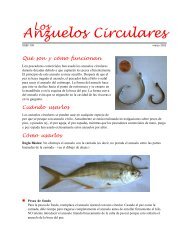Full document / COSOC-W-86-002 - the National Sea Grant Library
Full document / COSOC-W-86-002 - the National Sea Grant Library
Full document / COSOC-W-86-002 - the National Sea Grant Library
- TAGS
- nsgl.gso.uri.edu
Create successful ePaper yourself
Turn your PDF publications into a flip-book with our unique Google optimized e-Paper software.
487<br />
assigned to<strong>the</strong> Management Committee, a broadly based Gcnaittee, with<br />
representatives from user groups, envirormental groups, flimlrrlpnl<br />
gcjvsrnment, industry and federal and state nanacjemant agencies, m <strong>the</strong><br />
first fiscal year, and up to <strong>the</strong> tiro that <strong>the</strong> Managenent nimiittee was<br />
asked to approve <strong>the</strong> wcrkplan for tho second fiscal year, that Committee<br />
hadnot itself derived explicit management goals for <strong>the</strong> NBP. Instead,<br />
tieTechnical Advisory Committee (later called <strong>the</strong> Scientific and<br />
Technicial Advisory Ocnmittee), in close consultation with NBP staff,<br />
prepared a wcrkplan and Requests far Proposals (RFP's) which were<br />
approved with only minor modification by <strong>the</strong> Kanagenent Committee.<br />
Initially, no funds were allocated for policy studies, but near <strong>the</strong> end<br />
of <strong>the</strong> funding decision process, proposals were solicited for first one<br />
and <strong>the</strong>n two policy studies. Significantly, <strong>the</strong> Scientific/Technical<br />
Committee found itself unqualified to review policy proposals, and <strong>the</strong><br />
Management Committee created an ad-hoc Policy Issues Committee from<br />
among its own members to review <strong>the</strong>se proposals, none of whom are<br />
formally trained in policy formulation. By contrast, <strong>the</strong> members of <strong>the</strong><br />
Scientific and Technical Committee were chosen carefully to represent<br />
<strong>the</strong> highest level of technical skills available to <strong>the</strong> Project. Not<br />
surprisingly, less than 5* of <strong>the</strong> program funds in<strong>the</strong> first fiscal year<br />
were devoted to policy studies.<br />
Requests far Proposals for Fiscal Year 19<strong>86</strong> were generated in a manner<br />
similar to <strong>the</strong> previous year. The Management Committee still had not<br />
adopted explicit management goals to guide its sub-conmittoes. The<br />
Scientific and Technical Committee, working closely with <strong>the</strong> NBP staff,<br />
rrjco3aended t"*hn1">'1 RFP's and <strong>the</strong> ad-hoc Policy Issues Committee<br />
suggested areas for policy research. Nhen <strong>the</strong>se reached <strong>the</strong> Management<br />
Ccmsittee, <strong>the</strong> rw»w*~ recognized that <strong>the</strong>re was virtually no<br />
connection between <strong>the</strong> reccomeidatlaris of <strong>the</strong> tiro committees. This<br />
recognition provided <strong>the</strong> impetus for several lengthy meetings which<br />
resulted in identification of eight "Management Questions far<br />
Narragansett Bay" and <strong>the</strong>Management Committee agreed to use <strong>the</strong>se<br />
Questions as guides for RFP review.<br />
Two distinct approaches for <strong>the</strong> selection of projects to address <strong>the</strong>se<br />
Management Questions are likely to follow depending on whe<strong>the</strong>r <strong>the</strong><br />
initiative is taken by <strong>the</strong> Management Committee or by its subenonittees.<br />
If <strong>the</strong> Management Committee sets <strong>the</strong> agenda, it can, after considering<br />
<strong>the</strong> goals it has set, ask for <strong>the</strong> projects which promise to provide <strong>the</strong><br />
most significant progress toward answering <strong>the</strong> questions that have been<br />
posed. Because this approach tries to get <strong>the</strong> most information for <strong>the</strong><br />
resources available; this might be called a "maximizing" approach. On<br />
<strong>the</strong> o<strong>the</strong>r hand, if a cub-committee takes <strong>the</strong> initiative by submitting<br />
RFP's and workplans for approval, <strong>the</strong>n <strong>the</strong> test will be whe<strong>the</strong>r <strong>the</strong><br />
proposed research is relevant to <strong>the</strong> question at hand. Given <strong>the</strong><br />
breadth of most questions relating to <strong>the</strong> management of complex systems,<br />
relevance is not difficult to establish, and thus this test might be<br />
called a "satisficing" approach.<br />
The NBP Management Committee, perhaps because it faced time constraints<br />
because it delayed so long in articulating its Management Questions,<br />
clearly following <strong>the</strong> "satisficing" path. The Scientific and Technical<br />
Committee did not modify its reoormendationa in any way to respond to<br />
<strong>the</strong> Management Questions, and discussion centered on degree of<br />
relevance, not on whe<strong>the</strong>r mora productive projects could have been<br />
proposed. However, with <strong>the</strong> Management Questions before it, <strong>the</strong>



